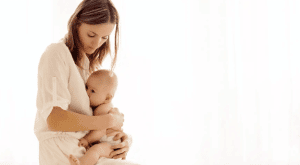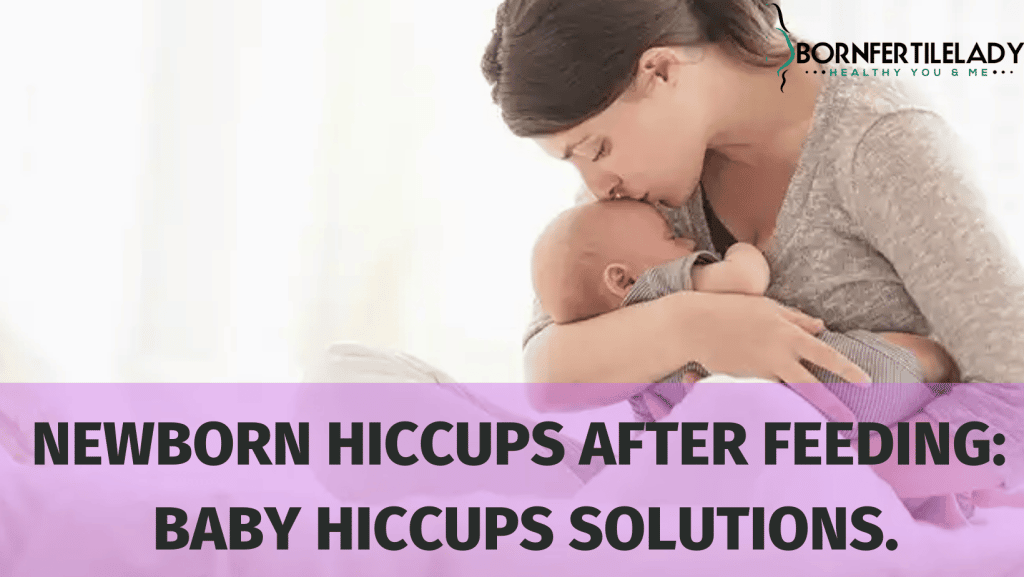Newborn hiccups can startle you and your baby, regardless of whether you experienced them previously or this is a completely new experience.
Baby hiccups may be startling at first, but you most likely notice them more than your infant does.
Nevertheless, there are a few techniques to be aware of to prevent these obnoxious spasms.

How to get rid of newborn hiccups
Babies usually aren’t harmed by hiccups. While hiccups can be irritating for adults, they typically make babies feel less anxious.
A baby can typically be left alone to stop hiccuping.It is advisable to talk to a doctor if they don’t cease.
Those who are worried and do not want to wait for infant hiccups to pass may find the following newborn baby hiccups solutions helpful:
1. Take a break and burp:
Since burping can get rid of extra gas that may be causing the hiccups, taking a break from feeding your baby to burp him or she may help relieve newborn hiccups after feeding.
Burping will also be beneficial because it positions your kid upright.
The American Academy of Pediatrics (AAP) advises burping your bottle-fed child both after each feeding and occasionally while they are eating.
When your baby switches breasts while being breastfed, burp them.
2. Change feeding positions
Consider feeding your child in a more upright position.
When your baby is eating, raising them on a pillow so they aren’t resting flat could help them breathe less thus preventing newborn hiccups after feeding.
Read also : What to do with leftover breast milk:12 creative ideas that will interest you .
3. Give gripe water
Gripe water typically contains the following herbs: ginger, fennel, chamomile, and cinnamon.
Some people think that gripe water may be beneficial if stomach problems are the cause of newborn hiccups after feeding… There is currently no scientific basis for this treatment, though.
A person may choose to try gripe water because the hazards are minimal.
4. Using a pacifier
The diaphragm may relax and hiccups may stop if your baby sucking on a pacifier.
5. Rubbing the baby’s back
They can unwind by giving their back a rub and swaying the infant back and forth.
This could prevent the spasms that lead to newborn hiccups after feeding…
Causes of newborn hiccup
When the vocal cords quickly close when the diaphragm contracts, this is what causes hiccups.
The hiccupping sound is produced when air is driven out of the vocal cords that are closed.
A sizable muscle that spans the bottom of the rib cage is called the diaphragm.
It oscillates up and down in response to breathing.
Although eating can occasionally cause the diaphragm to spasm, hiccups in infants typically occur for no obvious reason.
They could occur when a baby:
overeating, eating too quickly and taking in too much air.
The baby’s stomach may enlarge as a result of several circumstances.
The diaphragm is pushed upon when it expands, causing the spasms that cause hiccups.
Hiccups may also be a result of an underlying medical issue, such as gastroesophageal reflux(GER) if they occur regularly and are upsetting (GER).
When partially digested food and stomach acid pass back up the food pipe, this happens.These fluids may irritate the diaphragm and cause spasms as they move through it.
Hiccups are not usually brought on by eating or gastrointestinal problems.
Read also :Safe bed sharing,is it really safe ?
The cause of the diaphragm’s spasm may not be known.
Prevention of newborn hiccups after feeding.
Although it’s not always possible to avoid hiccups, the following techniques may be useful:
- Burp babies during feeding
- Feed infant before they grow overly hungry and feed them frequently in modest amounts to keep them quiet
- After each feeding, position the infant upright for 30 minutes.
- Use a nipple that is the proper size for your infant, with a hole that is neither too large nor too small. (If it’s too large, the breast milk or baby formula may flow out too quickly, and if it’s too little, he may swallow air when he doesn’t get enough milk.)
- Make sure your nursing infant has a strong latch.
- Speak with a lactation expert if you’re unsure.
- Avoid overfeeding your infant.Gas can develop if she eats too much.
- Adjusting the bottle to ensure that there is no air at the teat
- Making sure the infant’s mouth is closed over the entire nipple
- The bottle might need to be repositioned so that the air is towards the bottom rather than close to the nipple.By doing so, the baby will not suck on extra air that may result in hiccups.
How not to handle a baby’s hiccups
There are a few things that should never be done, even though there are many techniques to attempt and stop a baby’s hiccups:
- Never frighten or scare a baby to relieve hiccups.
- Avoid wiping their forehead with a moist cloth, as this also doesn’t work.
- One remedy that should never be tried on a newborn is holding one’s breath. Simply said, it’s unsafe.
- Many folks advise pressing on the infant’s forehead or anterior fontanelle and pulling on their tongue.
All the above may hurt your baby and is not advisable instead Simply wait it out and allow the hiccups to pass on their own.
How Long Do Baby Hiccups Last?
Hiccups in infants can occur multiple times per day and last up to 10 minutes.
If a baby is comfortable and doesn’t appear uncomfortable, their hiccups frequently aren’t a cause for concern. Although hiccups usually pass within a short while, they can be unsettling, especially for new parents and dads. Simply wait it out and allow the hiccups to pass on their own.
Can you put a baby to bed while they have hiccups?
Most of the time, there is no physical or medical reason not to put a baby on its back while they have hiccups because those tiny diaphragm spasms don’t affect breathing.
Of course, as you are aware, hiccups can be a bothersome inconvenience, and your baby may find them annoying, disruptive, or mildly uncomfortable.
In this case, you may want to hold them up until the hiccuping stops.
Nevertheless, infants who hiccup due to reflux may be more likely to vomit; if your child appears to be experiencing an unpleasant gastroesophageal reflux episode, try keeping them upright.
If you have any worries, it’s better to speak with your doctor.
In conclusion
Hiccups are not normally a cause for concern in babies under 12 months old.
Speak with a doctor if hiccups are frequent or if they seem to distress the baby because this can indicate an underlying health condition.
Read also : 9 most powerful nursing books for breastfeeding mothers .
Gastroesophageal reflux may cause frequent, uncomfortable hiccups. A baby may have gastroesophageal reflux if they also:
cry more often than usual, particularly around feedings, arch their back excessively during or after feedings, and spit up more often than usual.1
Anyone who suspects that a baby may have gastroesophageal reflux should speak with a doctor. The condition is easy to treat.
